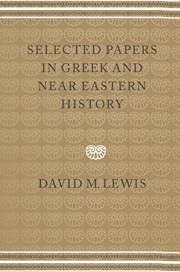Book contents
- Frontmatter
- Contents
- List of plates
- Preface
- Systems of reference
- GENERAL
- 1 Boeckh, Staatshaushaltung der Athener, 1817–1967
- 2 On the new text of Teos
- 3 The origins of the First Peloponnesian War
- 4 The federal constitution of Keos
- 5 The Athens Peace of 371
- 6 Preliminary notes on the Locri archive
- 7 Temple inventories in ancient Greece
- 8 Democratic institutions and their diffusion
- ATHENIAN
- NEAR EASTERN
- Bibliography
- Publications of David M. Lewis
- Indexes
8 - Democratic institutions and their diffusion
Published online by Cambridge University Press: 15 January 2010
- Frontmatter
- Contents
- List of plates
- Preface
- Systems of reference
- GENERAL
- 1 Boeckh, Staatshaushaltung der Athener, 1817–1967
- 2 On the new text of Teos
- 3 The origins of the First Peloponnesian War
- 4 The federal constitution of Keos
- 5 The Athens Peace of 371
- 6 Preliminary notes on the Locri archive
- 7 Temple inventories in ancient Greece
- 8 Democratic institutions and their diffusion
- ATHENIAN
- NEAR EASTERN
- Bibliography
- Publications of David M. Lewis
- Indexes
Summary
I shall try to define, from an epigraphic viewpoint, the effects that the two periods of Athenian political hegemony in the classical period and Athens' more continuous and longer cultural hegemony may have had on the Greek world as a whole. The subject could hardly be more important, but it is in some ways very neglected. The only major work I know in which the topic of the diffusion of Athenian institutions is a principal theme is Swoboda's Griechische Volksbeschlüsse of 1890, a work remarkable not only for the immense labour which must have gone into it but also for its general good sense.
Swoboda was entirely concerned with decrees, and they will also be my main concern. They provide the bulk of the evidence. As Finley points out in an article to appear in Annales, there is simply nothing, outside the major sanctuaries, to match the amount of administrative and factual detail which Athens found it necessary to put on stone. This fact is in itself significant and has something to tell us about the political climate of states outside Athens. I only happen to know one text, from Ephesos c. 300 BC (Inschriften von Ephesos 4. 20–4), where publication of documents is ordered so that O (βO∪λóμɛνOς Τwν πOλιΤwν may know, in this case, about the sale of land. The question of what it was thought necessary to publish extends to decrees themselves. The topic must be studied both chronologically and by subject. Swoboda complained of the infrequency of texts earlier than the Hellenistic period.
- Type
- Chapter
- Information
- Selected Papers in Greek and Near Eastern History , pp. 51 - 59Publisher: Cambridge University PressPrint publication year: 1997
- 3
- Cited by



